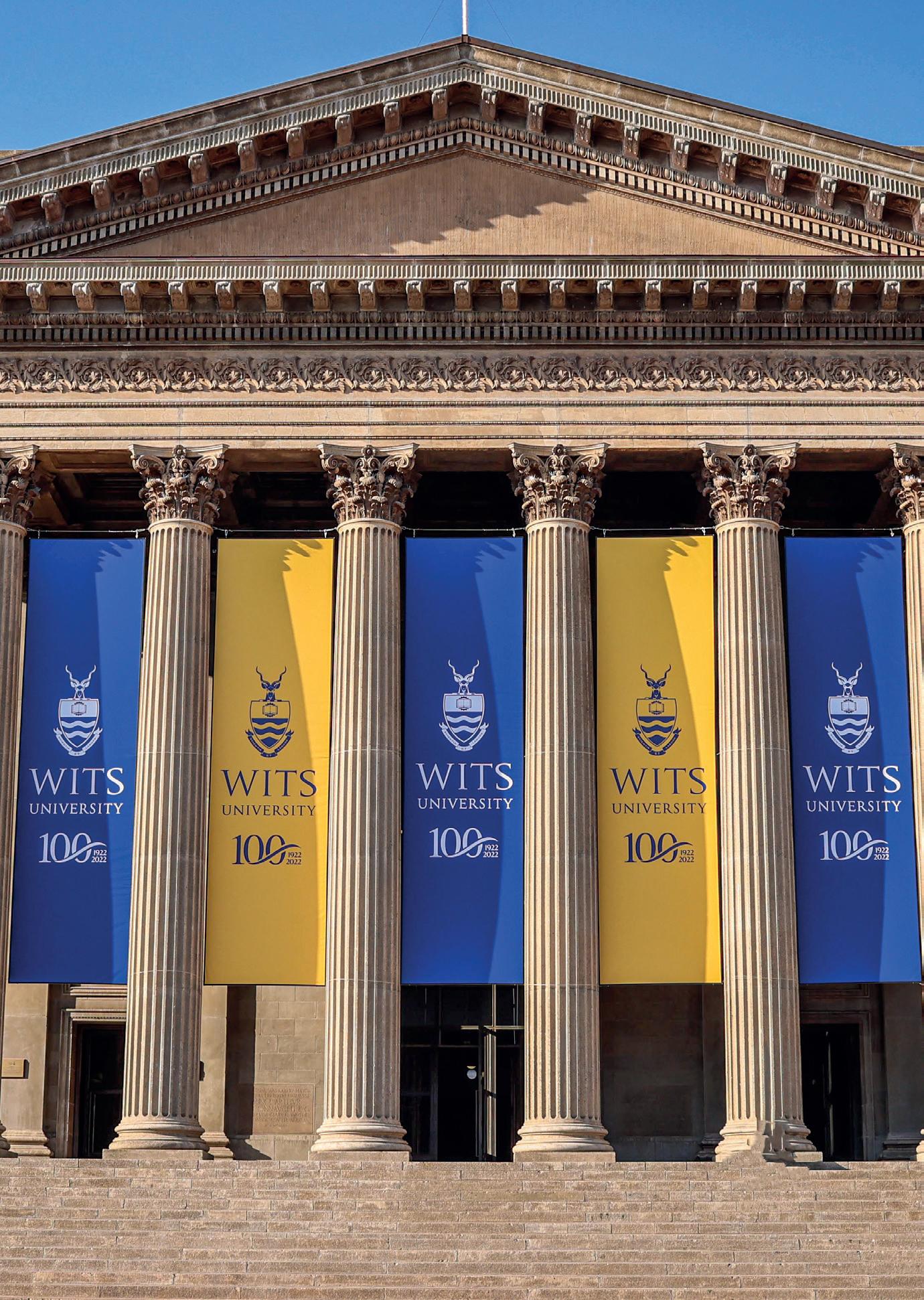Graduation Ceremony
Date: 17 July 2025
Time: 09:30
Venue: The Great Hall
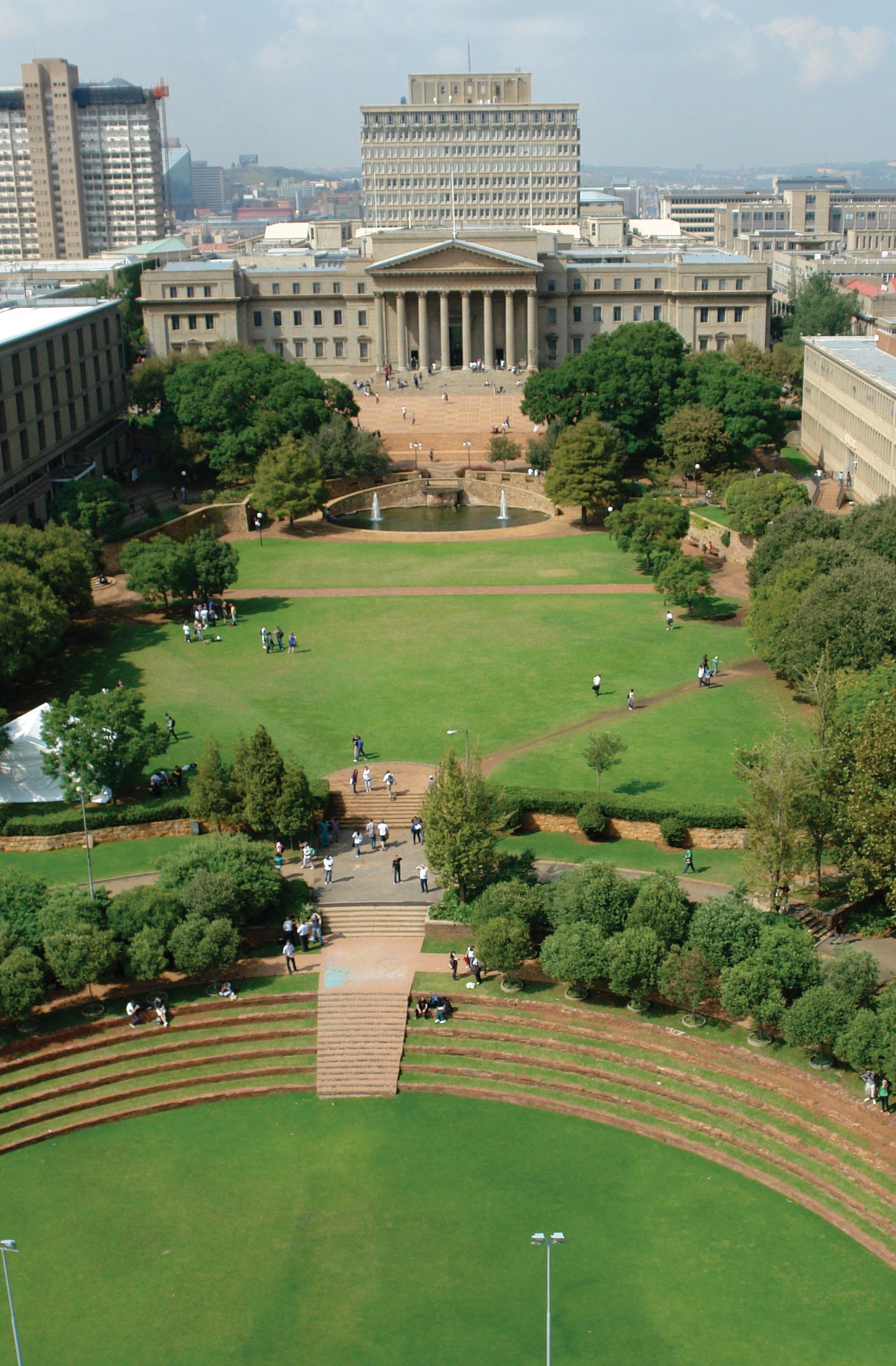

Date: 17 July 2025
Time: 09:30
Venue: The Great Hall

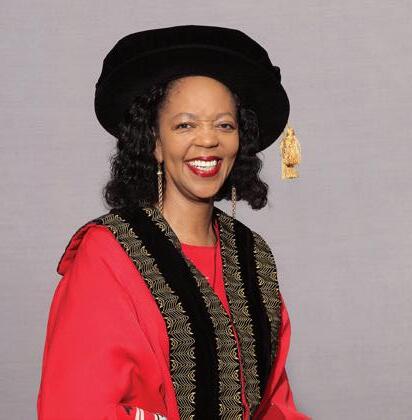
CONGRATULATIONS! HALALA!
GO LEAD SOUTH AFRICA TO GREATNESS!
A hearty congratulations to the class of 2025! Some of you are the first graduates in your family, well done! May your light shine for those who come after you! For those of you who are continuing in your family’s tradition, thanks for not dropping the ball. Education is the best self-investment. The past year changed the world as we know it, with no less than 60 countries and more than 1.3 billion people globally going to vote, including our own country. The outcomes have changed geopolitics, with the Global North becoming more internally focused. The resurgence of economic protectionism has altered trade landscapes, causing ripples across global markets. The rise of artificial intelligence and big data further reshapes the balance of power, as nations compete for supremacy in these fields. Climate change, a universal threat, has become a catalyst for geopolitical tension. The race for control over natural resources, especially in the Arctic and other vulnerable regions, has intensified. South Africa has not been spared in the regional conflict, losing our own young fighters for peace in the DRC.
As the twentieth meeting of the Group of 20 heads to our shores, a first for the continent of Africa, we have chosen Solidarity, Equality and Sustainability as our G20 theme. This speaks to our recognition of the interconnected of nations. Our shared future depends on mutual understanding, cooperation, equality and stability across nations. As our future leaders you need to adapt to an uncertain world, embrace diversity, and foster dialogue. That will help you to craft a healthier, more balanced world for future generations.
As you venture into the world, take time to expand the depth and breadth of your knowledge. Read outside your specialisation, engage with people outside your comfort zone. Understand the plight of people less fortunate than yourself. Be the change you want to see in your country first then the world. Leaders who leave footprints worth emulating, are not only the brightest but also those who take time to learn from others, who are accountable for their actions and omissions, who use what they know and what they have, to make the world a better place. Leaders who care. Those leaders do this consistently with Humility and Integrity, Always. May you be those leaders! HALALA!
CONGRATULATIONS! HALALA! GO LEAD SOUTH AFRICA TO GREATNESS!
Dr Judy Dlamini Chancellor

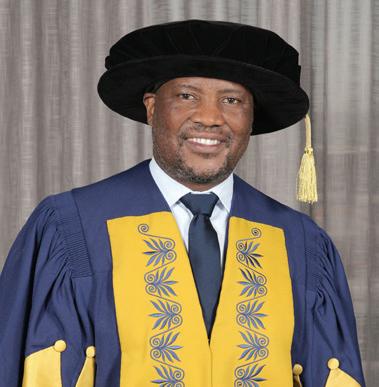
Dear Wits Graduate,
Congratulations on successfully completing your academic programme at the University of the Witwatersrand, the premier University on the continent.
You are now a member of an elite group of graduates of this august institution. More than 200 000 alumni at the cutting edge of excellence, both locally and internationally in business, the public sector, the academy, and in civil society have trodden this path.
Today, you become a member of this illustrious community.
Over the past 100 years, Wits has grown into one of the leading universities on the continent and a globally respected institution for its teaching and learning, knowledge creation and generation, and social impact. It has shaped the lives of many for the advancement of society. You are now an integral part of this proud and enduring legacy. Here at Wits, we actively pursue excellence and societal relevance in everything we do. From the abstract to the practical, our focus is on creating a space for the best thought, knowledge, and expertise to be unearthed and nurtured.
Wits is renowned for its intellectual leadership and for nurturing critical thinkers, creative innovators, problem-posers, and problem solvers. We have strived to match your ambition and drive to overcome the challenges thrown our way by the pandemic. Together we have reached the crest of the hill and proven, once again that excellence is achievable, even in times of uncertainty and adversity.
Your success has furthered our commitment to equipping the next generation of leaders with the skills and determination that you will need to find innovative and sustainable solutions to the pressing problems of the 21st Century.
As a Wits graduate, you had access to an exceptional educational experience. You have been exposed to a world-class academic and research programme and a vibrant community that makes you a true global citizen. You have been part of an institution that generates cutting-edge knowledge and innovation for South Africa and the world. It is now time for you to step into the world and use that experience, for good. We know that you will enter the next stage of your journey with the determination to build a better society tomorrow. I want to encourage you to remain a part of the Wits family by participating in our alumni programme and by further advancing the reputation of your alma mater.
Best wishes for the next steps of your journey and congratulations on being such a big part of the history of this illustrious institution.
Professor Zeblon Vilakazi, FRS Vice-Chancellor and Principal Wits University
Gaudeamus igitur
Juvenes dum sumus
Post jucundum juventutem
Post molestam senectutem
Nos habebit humus.
Ubi sunt qui ante nos
In mundo fuere?
Vadite ad superos
Transite in inferos
Hos si vis videre.
Vita nostra brevis est Brevi finietur.
Venit mors velociter
Rapit nos atrociter
Nemini parcetur.
Vivat academia
Vivant professores
Vivat membrum quodlibet
Vivat membra quaelibet
Semper sint in flore.
Vivant omnes virgines
Faciles, formosae.
Vivant et mulieres
Tenerae amabiles
Bonae laboriosae.
Vivant et republica et qui illam regit.
Vivat nostra civitas, Maecenatum caritas
Quae nos hic protegit.
Pereat tristitia, Pereant osores.
Pereat diabolus, Quivis antiburschius
Atque irrisores.
Let us rejoice therefore
While we are young.
After a pleasant youth
After a troublesome old age
The earth will have us.
Where are they
Who were in the world before us?
You may cross over to heaven
You may go to hell If you wish to see them.
Our life is brief
It will be finished shortly.
Death comes quickly Atrociously, it snatches us away. No one is spared.
Long live the academy!
Long live the teachers!
Long live each male student!
Long live each female student!
May they always flourish!
Long live all maidens
Easy and beautiful!
Long live mature women also,
Tender and loveable
And full of good labor.
Long live the State
And the One who rules it!
Long live our City
And the charity of benefactors
Which protects us here!
Let sadness perish!
Let haters perish!
Let the devil perish!
Let whoever is against our school
Who laughs at it, perish!
Nkosi sikelel’ iAfrika
Maluphakanyisw’ uphondo lwayo,
Yizwa imithandazo yethu, Nkosi sikelela
Thina lusapho lwayo.
Morena boloka setjhaba sa heso, O fedise dintwa le matshwenyeho, O se boloke, O se boloke setjhaba sa heso, Setjhaba sa, South Afrika — South Afrika.
Uit die blou van onse hemel, Uit die diepte van ons see, Oor ons ewige gebergtes, Waar die kranse antwoord gee,
Sounds the call to come together, And united we shall stand, Let us live and strive for freedom In South Africa our land.
The Wits Choir
The Wits Choir has been around since 1995. Their repertoire is colourful and vibrant. They perform regularly at graduations and important ceremonies. The Wits Choir has toured internationally as well as playing host to other choirs here. They are also active in the community, undertaking choral outreach programmes.
17 JULY 2025 AT 09:30
The audience will rise as the academic procession enters the hall and will remain standing until the Chancellor is in place
The Chancellor will constitute the congregation
The Chancellor will welcome the graduands and guests
Address to the congregation
Conferment of degrees and granting
The President of Convocation will address the graduates
The Chancellor will dissolve the congregation
The audience will stand while Ihele is played
Members of the audience are requested to stand while the academic procession leaves the hall and not to leave the hall before the end of the ceremony.
In the event of load-shedding or power cuts, the Great Hall may become totally dark until the generator comes into operation.
DEAN: PROFESSOR M MUSEMWA BA Hons (Zimbabwe) MA (Cape Town) PhD (Minnesota, USA) MASSAf
ASKEW, Ashleigh (with Distinction)
Education DISSERTATION: Teachers' experiences in fostering curiosity in the classroom to improve learning outcomes: a study of three independent secondary schools in KwaZulu Natal, South Africa
EGBERINK, Georgina Sarah
Educational Psychology RESEARCH REPORT: Inclusive Education and the associated classroom challenges: the teachers' perspective with a focus on ASD
EMANT, Paul Martin (with Distinction)
Education RESEARCH REPORT: An investigation into how school leaders interpret decolonisation in the English curriculum, and its impact on schools' internal education policies: a case study of two independent schools in Johannesburg
HADEBE, Nkululeko Petros
Educational Psychology RESEARCH REPORT: An exploration of the nature of school-based support teams' capacity to implement inclusion policies in township schools: a cultural-historical activity perspective
MAGWAZA, Sinothile Luyanda Silindile
Education RESEARCH REPORT: Learning to integrate the affordances of interactive smartboards when teaching population ecology to Grade 11 Life Sciences: a self-study
MATHIBELA, Phumzile Mmangwasa Innocentia
Education RESEARCH REPORT: Girls' access, participation, and achievement in grade 10 physical science subject in a selected rural school in Limpopo: Sekhukhune district, South Africa.
MNQONYWA, Ndileka (with Distinction)
Education RESEARCH REPORT: Mapping South African teachers' recognition and use of ICT pedagogical affordances: a pilot study of the E-WITS model
MORUDU, Koketso
Education RESEARCH REPORT: Exploring the use of ICT in a TVET college course: Towards blended learning in automotive repair and maintenance
MOSAKA, Lebogang Sybil
Education RESEARCH REPORT: Barriers to Learning in Full- Service Schools: Perspectives of Teachers and School Leaders
MOTSAMAI, Refilwe Penelope
Education RESEARCH REPORT: Teachers' perceptions and practices of inclusive education: a case of one full-service school in Soweto
MUREMBIWA, Nakisani (with Distinction)
Education RESEARCH REPORT: An investigation into the factors that hinder the implementation of inclusive education of learners with physical disabilities in one selected private mainstream school in Vhembe district, Limpopo
NAIDOO, Mikaela Kayleen
Educational Psychology RESEARCH REPORT: South African parents' perceptions of online learning during the COVID-19 pandemic
NDHLOVANA, Shalom Nokuthula (with Distinction)
Education DISSERTATION: Exploring the transformative potential of translanguaging in a multilingual Grade 4 Natural Science classroom in Johannesburg.
NDLOVU, Khanyisile Ntokozo
Educational Psychology RESEARCH REPORT: The influence of youth substance dependency on the mental health of parents living in Soweto, South Africa
SAHULA, Mpho Siphokazi Gift (with Distinction)
Education RESEARCH REPORT: Learner leaders' voices on the male dropout in secondary schools in Mogale city: a qualitative case study
SEFAKO, Violet Magalane Melleser
Education RESEARCH REPORT: An investigation of the use of language to develop concepts of Human Reproduction in a Grade 9 Natural Sciences classroom
SHUMBA, Thato Jessica (with Distinction)
Education DISSERTATION: The impact of using monolingual pedagogies in South African classrooms on the academic performance and social inclusion of African learners who are learning through an additional language.
THOKA, Mmatshepo Brenda
Education DISSERTATION: An investigation on the integration of indigenous knowledge to teach `Environmental Studies' at Grade 11: a case of schools in Bakenberg south circuit, Limpopo province
TWALA, Busisiwe Prudence
Education RESEARCH REPORT: Teachers' self-efficacy beliefs in teaching learners with learning barriers in one mainstream secondary school in Soweto
AFRICA, Charnédah Devoné
AHMED, Raeesah
BAATJIES, Badronisha Raiza
BANDA, Kerile
BATTAY, Saeedah (with Distinction)
BUTHELEZI, Fisiwe Khanyisile
BUTHELEZI, Nokuphila Sphiwe (with Distinction)
BUTHELEZI, Thembisile Sindiswa (with Distinction)
CHIKELE, Albert (with Distinction)
CLEARY, Jessica Kaylee
DEKA, Tumelo Felicity
DELEKI, Precious Tinyiko
DIOGENIDIS, Erin Thirza
DITOLE, Refilwe
DITTA, Humairaa Rafiq (with Distinction)
DLAMINI, Linda Kenny (with Distinction)
DOS SANTOS, Kyana
DUBE, Phillip
EBRAHIM, Sameerah
GUMENKE, Sekelwa Prudence
HARTZENBERG, Megan (with Distinction)
HLATSHWAYO, Wandile Sibusiso
HUSSAIN, Sabeeha
JAFFER, Tasmiyah (with Distinction)
JEEWA, Naseeha
KGOBE, Nichol
KGOMO, Nthabiseng Ignecia
KHAN, Tasmiyah (with Distinction)
KHARODIA, Humaira
KHOZA, Nhlamulo
KHUMALO, Anele Zuzile
KHUMALO, Lindokuhle
KHUMALO, Mubongiseni
KOUTAKIS, Tia
KUBHEKA, Ntsikelelo
KUBJANA, Eric Phuti
KUMALO, Refiloe Charlotte Ntombi
KUTAMA, Mosa Boitumelo Vanessa
LAHER, Fatima (with Distinction)
LEBEA, Lebogang Patricia
LE GRANSIE, Chadley David Cuyle
LEPHALALA, Dintle Sharon
LEPOLESA, Mamaqoboto Adela
LOUW, La'reen
LUBUZO, Rebecca Nomsa
LUTYA, Mbalentle
MABE, Mathapelo Portia
MABONA, Gugu Clementine
MACHERU, Modjadji Neriah
MADINANE, Noluthando Andiswa (with Distinction)
MAGAGULA, Bathandiwe Lwandiswa (with Distinction)
MAGUBANE, Khulekani Sibusiso Handsome
MAHANO, Boitshepo
MAHLABA, Katleho
MAHLANGU, Sphiwe
MAKGOKA, Precious Lesego (with Distinction)
MAKGOPA, Thabiso
MAKOTANYANE, Botle
MAKWABE, Masixole Cecil
MALEJANE, Dennis (with Distinction)
MALEMA, Sebasa
MALULEKE, Miyelani
MASANGO, Thabo Mishack
MASEKELA, Tshepiso Promise
MASEMOLA, Kamohelo Makope
MASEMOLA, Prudence (with Distinction)
MATHEBA, Thato
MATHIBE, Happy Valencia
MATULA, Botlhale Charmaine
MBATHA, Samkelisiwe Prosperous
MBATHA, Thembinkosi
MBOLA, Zusive Masande (with Distinction)
MBUYISA, Kabelo Peter (with Distinction)
MGUBULI, Mveli
MIHAJLOVIC, Luka (with Distinction)
MIYA, Mamosebetsi Perseverence
MKHIZE, Andile Theodorah
MKHIZE, Zesande (with Distinction)
MKHWANAZI, Sifundo Sibusiso
MKUMBUZI, Asiphe (with Distinction)
MLAMBO, Candid Nokukhanya (with Distinction)
MLAMBO, Londeka
MLOTHA, Fanyana
MNYANDU, Ntombenhle Nqobile (with Distinction)
MODJADJI, Mmapula Samantha
MOFOKENG, Clara Tidimalo
MOKAOLE, Emmanuel Peter
MOKOANA, Godfrey (with Distinction)
MOKONYANE, Tswelelo Bonolo
MOLELEKOA, Boitumelo Gladness
MONTSHA, Nthabiseng Pretty
MPEMBE, Siphokazi (with Distinction)
MPHALI, Nompumelelo Katleho
MPOSI, Mpho Lopez
MTHEMBU, Malwande
MTHETHWA, Solomon
MTHETHWA, Vuyokazi
MTIMKULU, Andile Hanulton
MTSHALI, Nokwazi
NAIDOO, Alycia
NAMENG, Keyaleboga Angel (with Distinction)
NDEBELE, Sharon Gugu
NDHLOVU, Prestige Makhie
NDLOVU, Alice Sakhile (with Distinction)
NDLUZELA, Yolisa (with Distinction)
NDUZULWANA, Nandipha
NGCOBO, Buhle Lindiwe Matilda (with Distinction)
NGCOBO, Sabelo Banele
NGCOBO, Sinothile
NGOMA, Zanele Innocentia
NGUBO, Lwazi Romeo (with Distinction)
NGUDLE, Lindokuhle
NHLABATI, Mthokozisi Prince
NICOLAOU, Maria Helen-Catherine
NKOANA, Mpule Florence
NKOSI, Nkosinathi Mathews
NKOSI, Nokwanda Innocentia
NKOSI, Phumla (with Distinction)
NKOSI, Sbuyiselo Welcome
NKUNA, James Themba
NTAMANE, Ayanda
PAMBUKA, Reabetsoe
PATEL, Waseem (with Distinction)
PHAHLA, Thembokuhle Nothando
PILLAY, Adrienne Paige
RABINDA, Muphulusi Precious (with Distinction)
RABORIFI, Kelebogile Violet
RAMETSE, Karabo Anthony (with Distinction)
RASMEN, Mbongeni
RIKHOTSO, Enostacia Joy (with Distinction)
ROBERTSON, Shanley Leanne Shernay
SAKHAU, Lesego Ipeleng
SANDERSON, Paige (with Distinction)
SEABI, Thapelo
SEBEGO, Keamogetse
SERAMA, Malope Sepheu
SHAHZAD, Sana Zainab
SIBIYA, Refilwe Precious
SIOGA, Maureen Vhulenda
SITHOLE, Fisokuhle (with Distinction)
SMITH, Jada Revein
SMITH, Karinda (with Distinction)
SOOBRAMONY, Kaitlyn
SUKWANA, Sibulele Kago (with Distinction)
TENYWA, Sumayiyah (with Distinction)
SACHA, Jonas Elia (with Distinction) (Posthumously)
THABANCHU, Thapelo Francis (Posthumously)
TITIMA, Nandipha Precious
TSHABALALA, Thulisile Sweetness
TSHABANGU, Lehlohonolo Chloe (with Distinction)
TSHIKHUDO, Khumbelo Faith
TSIMANE, Tshegofatso Katlego
TWALA, Gugulethu Nkanyezi Mpumelelo
VALLABH, Anjali (with Distinction)
VAN LOGGERENBERG, Beandri (with Distinction)
VILAKAZI, Zamokuhle Sinenhlanhla
XOLO, Siniko Drezen
ZONDO, Bongiwe Zanemvula
ZWANE, Zandile Bongiwe
Prizes to be presented at the Faculty’s prize giving
The SAHETI School Prize (Honours):
For the best Bachelor of Education Honours student
Saeedah Battay
Keyaleboga Angel Nameng
Waseem Patel
Chancellor
DR NJ DLAMINI MBChB (Natal) DOH (Free State) MBA (Witwatersrand) DBL (Unisa) PGCE (Witwatersrand) IEC (Stanford-USA)
Vice-Chancellor and Principal
PROFESSOR Z VILAKAZI BSc (Manchester) MSc PhD (Witwatersrand) FRS, FAAS, MASSAf
Chairman of Council
MR I SHONGWE BA (Wesleyan) MPhil (Oxford)
Senior Deputy Vice-Chancellor (Academic)
PROFESSOR R OSMAN BA (Witwatersrand) HDipEd BEd (Unisa) MEd PhD (Witwatersrand) MASSAf
Deputy Vice-Chancellor (Research and Innovation)
PROFESSOR L MORRIS BSc (Hons) (Witwatersrand) DPhil (Oxford) FRSSA FAAS MASSAf
Deputy Vice-Chancellor (Systems and Operations)
PROFESSOR IR JANDRELL BSc(Eng) GDE PhD (Witwatersrand) IntPE(SA) PrEng FSAAE FSAIEE SMIEEE
Deputy Vice-Chancellor (People Development and Culture)
PROFESSOR G STEVENS BA (Cape Town) BA (Hons) Psych MPsych (Western Cape) DLitt et Phil (UNISA), MASSAf
Registrar
MS CG CROSLEY BA HDipEd (Witwatersrand) BEd Hons (Unisa) MEd (Witwatersrand)
Chief Financial Officer
MS MM MANYAMA CA (SA) BCom Accounting (Cape Town) BCompt Hons (Unisa) BCom Hons Taxation (Pretoria) MBA (GIBS)
Dean of Student Affairs
MR JAP SEPTEMBER BA MPhil (Cape Town)
DEANS OF THE FACULTIES
Faculty of Commerce, Law and Management
PROFESSOR J COHEN BCom Hons PhD (Witwatersrand)
Faculty of Engineering and the Built Environment
PROFESSOR T MAJOZI BSc(Eng) MSc(Eng) (Natal) PhD (UMIST) CEng PrEng FIChemE FAAS MASSAf FWISA FSAAE
Faculty of Health Sciences
PROFESSOR SA MADHI MBBCh MMed PhD (Witwatersrand) FCPaeds(SA) MASSAf RSSAf TWAS CBE
Faculty of Humanities
PROFESSOR M MUSEMWA BA Hons (Zimbabwe) MA (Cape Town) PhD (Minnesota, USA) MASSAf
Faculty of Science
PROFESSOR N CHETTY BSc Hons (Natal) MS PhD (U. Illinois Urbana-Champaign) MASSAf MSAIP MRSSA
President of Convocation
MS K MUFAMADI BA LLB LLM (Witwatersrand)
The Faculty of Humanities is a leading, vibrant, dynamic centre of teaching and learning as well as a hub of academic and research excellence on the continent.
Our students undergo rigorous theoretical and methodological training which imparts strong research and analytical skills and enables them to adapt, and often define, the constantly changing world of work. Our students learn to think critically – they are problem-posers, problem-solvers, and active social citizens who make a difference in society. The Faculty has a student-centred ethos which simply means that through its Teaching and Learning Unit, it offers student support in a timely manner and ensures that it is relevant to students’ needs; helps student develop a strong sense of purpose and assists students to recognise the value of their humanities degree.
The creative suite of programmes on offer in the Faculty equips our students to compete globally and to act locally. To this end, the Faculty engages creatively and critically with its location in Johannesburg – South Africa’s most globally networked city – taking advantage of its dynamic political, social, economic, and cultural links to the rest of Africa and the world.
The Faculty drives innovation in our undergraduate and postgraduate studies by encouraging multi-disciplinary, cross-disciplinary, inter-disciplinary and trans-disciplinary programmes that link the arts, social sciences, natural sciences, engineering, health sciences, education, and law. To this end, we have collaborative degrees in Digital Arts, E-Science, , Public Health, and Law. Given that Wits is a research-intensive university, the Faculty is steadily increasing its post-graduate enrolments in order to innovate and service the needs of our fast-changing world. The Humanities Graduate Centre is a home for collaboration and public intellectual activities where students are active participants.
The Faculty offers a wide range of research-oriented programmes, including professional degrees. Collectively, our programmes impart skills that offer graduates access to a range of careers across a variety of professions in the public and private sectors, including, academia, research institutes and science councils, governmental and non-governmental organisations, civil society, and corporate enterprises, amongst others.
Renowned for its distinguished academics and scholars, the Faculty is home to globally acclaimed and emerging scholars working at the horizon of the knowledge economy. Its cosmopolitan mix of international and local staff are located in a number of disciplines that are highly ranked across a range of global higher education measures. It is home to more than 70 researchers rated by the South African National Research Foundation as having national and international standing. Our scholars are innovating at the leading edge of research in the areas of African art, area studies, cities and housing, human migration, diversity and difference, critical race studies, violence, gender and sexuality, cultural studies, trans-languaging, narrative, and labour/work, etc. Our mission is to develop and advance globally impactful scholarship on the questions that define and disrupt what it means to be human in the twenty-first century.
The Faculty comprises five schools, namely, the Wits School of Social Sciences, Wits School of Education, Wits School of Arts, the Wits School of Human and Community Development and the Wits School of Language, Literature and Media. The Faculty boasts a number of prestigious research institutes and groups including the ; the Wits Institute for Social and Economic Research; the Centre for Researching Education and Labour; the History Workshop; the African Centre for Migration and Society; and the Wits Centre for Diversity Studies and Society, Work and Politics.
To complement the research institutes, we host 8 prestigious research chairs.
NRF Chair in Critical Diversity Studies
NRF Chair in Mobility and the Politics of Difference
NRF Chair in SA-UK Bilateral Chair Political Theory
NRF Chair in Skills Development in PSET
NRF Chair in Advancing African Languages for Social Inclusion and Success in Higher Education
NRF/FRF Chair in Mathematics Education
NRF/FRF Chair in Numeracy Education
UNESCO Chair in Teacher Education for Diversity and Development
To demonstrate Wits University’s commitment to making a contribution to finding well researched solutions to the scourge of gender-based violence and femicide as well as promoting digital humanities, the Faculty has been endowed with two more prestigious research chairs:
NRF/FALF Chair in Gender-Based Violence and Femicide
NRF/British Academy Chair in Digital Humanities
All this is to emphatically underscore the point that the Faculty of Humanities remains a dynamic hub of teaching innovation, research excellence and critical scholarship embedded in a local and global society. Our extensive list of renowned alumni provides inspiration for our current students and new graduates to leave their mark in society.
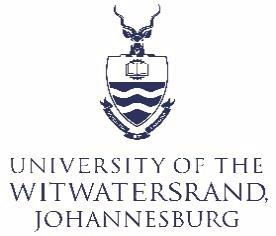
1. In the event of an emergency and/or fire:
The presiding official (Chancellor/Vice-Chancellor/Deputy Vice-Chancellor) will make an announcement requesting guests, graduands and staff to keep calm and remain seated; The Ushers will assist guests to proceed to the nearest Emergency exits in order to evacuate the Great Hall in an orderly fashion; Emergency exit signs are visible in red above all exit doors situated on your left and right hand sides as well as the back of the Hall;
The Ushers will assist the elderly and disabled guests out of the building; The academic procession on stage must exit through the back stage door; Once outside the Great Hall all guests, graduands and staff must proceed to the main assembly point on the piazza.
2. In the event of a Bomb threat
All bomb threats will be treated as real in order to protect lives and property and the premises will be evacuated immediately.

Dear Wits Graduate,
There are a few defining moments in life – and it is without doubt that graduation is one of them!
Today, you enter the world as a graduate from one of the top universities on the African continent. You enter into a world filled with many challenges, but a world that is also filled with limitless possibilities. May you meet all the challenges and opportunities that await you with pride, drive, passion, innovation, social-conscience and positive-purpose.
In addition to earning the degree conferred upon you today, you have also earned the right to be associated with a special group of individuals – the Convocation of Wits University. Convocation represents all the degreed graduates of Wits and forms a vital link between the University and the global community in which it operates. Membership to Convocation is free and serves as an official channel, allowing you, the members, to convey to the University management your views about the University. This membership comes with several unique privileges, which include nominating the Chancellor of the University. The Convocation Executive has two members on the Wits Council (the governing body of the University) and maintains other regular contact with the University to ensure the voice of the Convocation is represented at the highest levels of The University.
There are approximately 250 000 Wits alumni worldwide. The distinction of our university is important to the prestige of our collective qualifications. We call upon you to nurture and enhance the value of your degree by promoting Wits’ image, preserving our values, and contributing towards our ongoing development, ensuring that we grow in stature as a globally competitive, proudly South African institution of higher learning. Please engage with us via our numerous social media channels and keep connected with us so you can access career support, receive invitations to events and reunions and have sight of all the latest news about Wits and prominent Witsies: www.wits.ac.za/alumni/updateyourdetails/
I would like to extend a warm welcome to you – you are now a #Witsie4Life!
Ms Kgomotso Mufamadi President of Convocation Wits University

Convocation is a statutory body that includes all graduates of the University. Convocation is the largest constituency of the University (since the founding of the University in 1922, graduates number over 200 000). Its statutory mandate is to “… discuss and state its opinion upon any matters relating to the University including matters referred to it by the Council” and allows for the views of graduates to be represented at the highest levels of governance of the University.
Words and music by S.B.P. Mnomiya
Anhom
Falalala
Obani labo?
Baphi Ahhom?
Ngibona beza
Beyikazela
Bathwel ‘ongiyane
Bavela kuphi na?
Obani labo?
Ongqondongqondo
Osibakhulu
Yibo labo hhom!
Yini na leyo?
Ihele
Ihele lezingwazi zakithi
Ahhom udwendwe
Ahhom
Udwendwe lwezingqwele zakithi
Nant’ ihele
Longqondongqondo
Nant’ ihele
Losibakhulu
Udwendwe
Udwendwe Iwezingqwele zakithi
Who are those? Which, Falalala?
I see them coming
Walking with swinging garments
They are wearing head rings
Where do they come from?
Who are those?
They are people with knowledge
They are people in authority
These are the ones
What is that?
It is a procession
A procession of our heroes
It is a procession
A procession of our champions
Here is a procession
Of people of knowledge
Here is a procession
Of people of knowledge
A procession
A procession of our heroes
Ihele is known as the ‘Black’ Gaudeamus Igitur. In song, the writer, Mnomiya uses very poetic language to describe a graduation ceremony. The soloist sings of the ‘strange’ procession of people in long robes and head gear. The choir responds by saying that these people are academics who read profound books of knowledge.
Mnomiya goes on to say that the graduates are an inspiration to all of us, and we will also graduate like them one day. The song goes on to wish the graduates well and it ends with a resounding “Halala” (well done!).
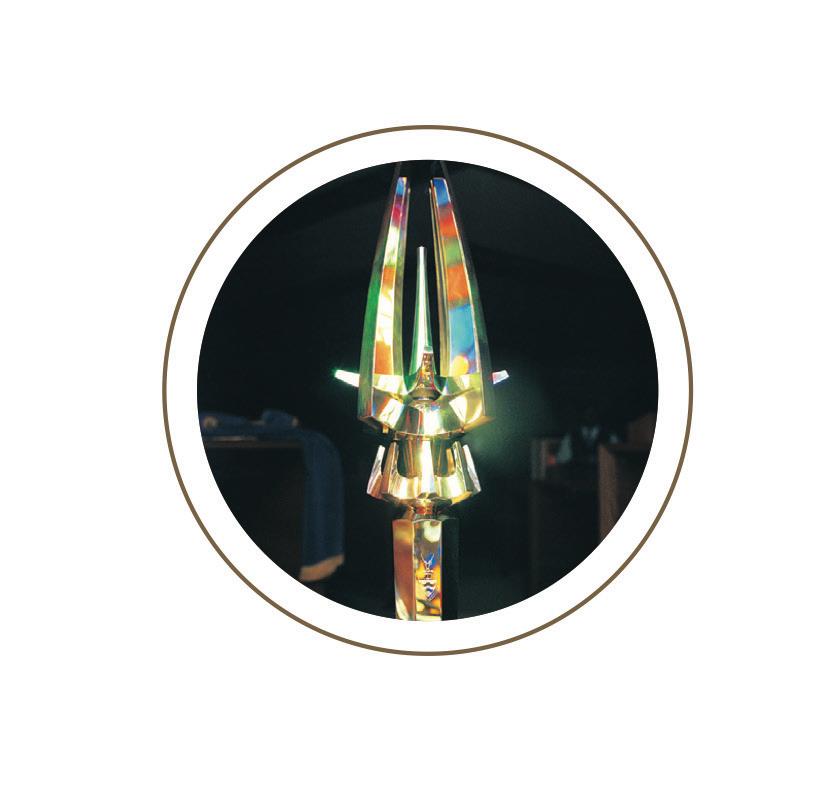

Maces were originally weapons of defence, designed to break through armour. In medieval times, bishops carried a mace instead of a sword into battle to enable them to defend themselves in accordance with the canonical rule that forbade a priest to shed blood. In time, the mace has come to be regarded as a symbol of delegated authority vested in a person or an institution. At this University, it is a symbol of the authority vested in the Chancellor and a reminder of the mandate given by the legislature of this country to the University to grant degrees.
The University mace is the work of the Edinburgh designer, silversmith and engraver, William Kirk, who designed and made the mace of the University of Stirling and of other institutions. It is silver-and gold-plated, is 1070 millimetres long and 180 millimetres broad and weighs seven kilograms. The heraldic devices used in the decoration reflect the character of this University as an institution of learning, set in a mining centre within the Republic of South Africa.
The head of the mace with its spreading vertical blades is symbolic of the horns of a springbok. The central vertical spike is representative of a rock drill on the mine, and the amber stone set in the head is intended as a tribute to a past Chancellor through its association with his name, Bernstein, which in German means amber stone. The heavy quality of the head is consistent with the traditional concept of the mace as a weapon of defence. The collar repeats the shape of the head. It consists of eight cogs which symbolise the cog-wheel in the University coat of arms and represents mining and industry. The shaft is octagonal and divided into three sections. The coat of arms of the University is placed on the shaft under the collar. Below this the words Universitas Witwatersrandensis Johannesburgi: are inscribed, followed by the date in Roman numerals – MCMLXXVI (1977) – which signifies the year of the dedication of the mace.
The mace is a symbolic portrayal of this University, this city, the Witwatersrand and the Republic of South Africa. It is a constant reminder to members of Council and Senate to uphold at all times the rights, powers and privileges of the University and its governing bodies.
The academic dress of this University is patterned on that of the Universities of Oxford and Cambridge, with modifications based on the model of the University of London and certain individual features, particularly in the costumes of office bearers and the hoods of degreesof bachelor and master.
Dress for Office Bearers
• The Chancellor wears a scarlet silk gown with a broad facing of black velvet down each side, embroidered in gold and a black velvet cap with gold cord and tassels.
• The Vice-Chancellor and Principal wears a blue silk gown with a broad facing of gold silk down each side, embroidered in blue, the sleeves being lined with gold silk. The cap is of the same design as that of the Chancellor.
• The Chairman of Council wears a black silk gown with a broad facing of red velvet down each side and around the neck, the sleeves being lined with gold silk. The cap is of the same design as that of the Chancellor.
• The academic dress of the Deputy Vice-Chancellors and the Executive Directors is the same as that of the Vice-Chancellor and Principal, except that the colour of the facing and sleeves of the gown and of the cord and tassels of the cap is silver-grey.
• The gown of the President of Convocation is of blue silk, with a broad facing of gold silk down each side, the sleeves being lined with white silk. The cap is the same as that of the Chancellor, but with a blue cord and tassels.
• The Registrar wears a black silk gown with a broad facing of blue silk down each side, bordered with gold braid. The cap is the same as that of the President of Convocation.
• A member of Council wears a black silk gown with a broad facing of gold silk. The cap is the same as that of the Chancellor.
• The gown of the President of the Students’ Representative Council is black with a broad facing of blue satin.
Graduands’ Gowns
• The gowns for all degrees of bachelor and master of the University are black, of the same pattern as the gown for a Master of Arts at the University of Oxford.
• The gown for the degree of Doctor of Philosophy is scarlet, after the University of London pattern.
• The gown for a senior doctorate is the same as that for the PhD, but with a gold satin facing on each side of the gown and with the sleeve button and cord in gold.
The Academic Hood
The academic hood is the principal feature of the costume for holders of our degrees of bachelor and master. The hood for the PhD is standard, regardless of the Faculty in which the degree was obtained. It is scarlet silk, lined with white silk.
Degree Colours
The hoods reflect the colour or colours of a particular degree or associated degrees.
As a 102-year-old public university in South Africa, Wits is proud of its record of achievement as a significant contributor to our society. We contribute capable people to society that are training in their chosen field that are engaged and able to tackle problems using evidence-based solutions. We also engage with our communities to share knowledge that we create so as to make a positive impact on the quality of life. Wits for Good.
Wits is a world-class research-intensive university based on our intellectual excellence, international competitiveness, and commitment to social justice; all of which have a measurable impact.
Here are a few of many differentiators:
• An international perspective that helps us maintain high standards in teaching and learning and research while not distracting us from our place in Johannesburg, South Africa, and Africa. In 2024 Wits authors published articles with co-authors from 199 universities, 94% of which were from countries other than South Africa.
• An intellectual hub of Africa, a founding member of the African Research University Alliance. In 2024 Wits published 2 342 articles with co-authors in Africa, including 32 articles with Namibia, 61 with Botswana, 87 with Zimbabwe and 36 with Mozambique.
• An active and engaged community leader that takes a stand on social issues and is fully committed to the advancement of the public good.
• A growing contribution to the body of knowledge through peer reviewed academic publications: 4 563 in 2024 and an average growth rate of 4% per year over the last five years.
• Knowledge contribution that is above global quality averages in several fields including: clinical and pre-clinical health studies (76% above global norms); arts and humanities (58% above global norms); life sciences (36% above global norms); physical sciences (12% above global norms).
• Wits is particularly associated with the study of the fields of virology, particle physics and the Higgs Boson, malaria, archaeology, paleontology, paleoanthropology, violence, local and regional politics, geochemistry, rock mechanics, deep mining, forensic anthropology, climate change, migration, social justice, and many more.
• Proud of the four Nobel laureates and the 99 Rhodes Scholars.
• Proud of our current 42 000 students of whom 16 600 (40%) are undertaking postgraduate studies and learning to make their own unique contributions to the global knowledge base.
• Proud of our more than 200 000 graduates. More than 90% of Wits graduates obtain permanent employment within 12 months of graduation.
• Proud of its ability to raise external funding to support and drive its research efforts, with contributions exceeding R 2 billion per annum.
